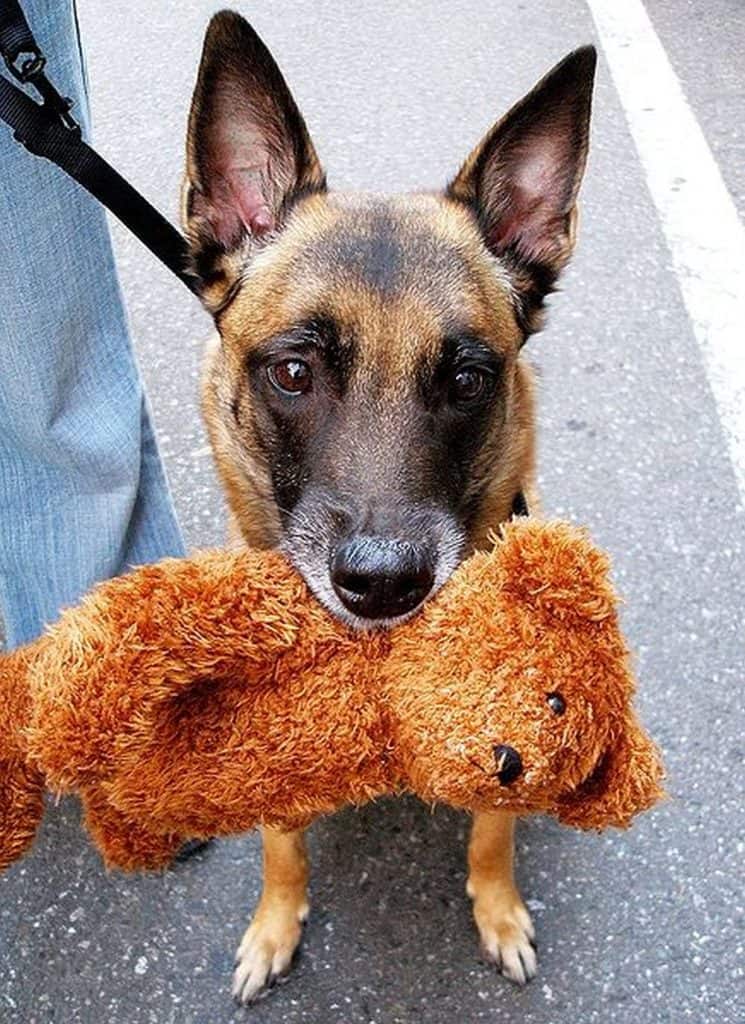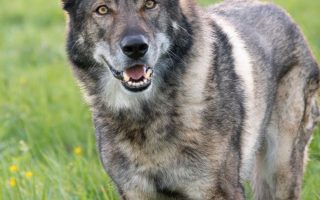Biting is not an uncommon behavioral problem in some breeds.
Even if biting is minor, it should never be an acceptable habit. If it is not addressed as soon as possible, it can quickly get out of hand.
Biting is usually a conduct practiced by young puppies, but some dogs may even carry on this behavior into adulthood.
This could be either because they have not learnt proper, appropriate conduct, or they may be doing it for other reasons.
However, when biting presents in an adult dog, proper training must be put in place to deal with this problematic issue.
[wpsm_toplist]
Why Do Belgian Malinois Bite So Much?
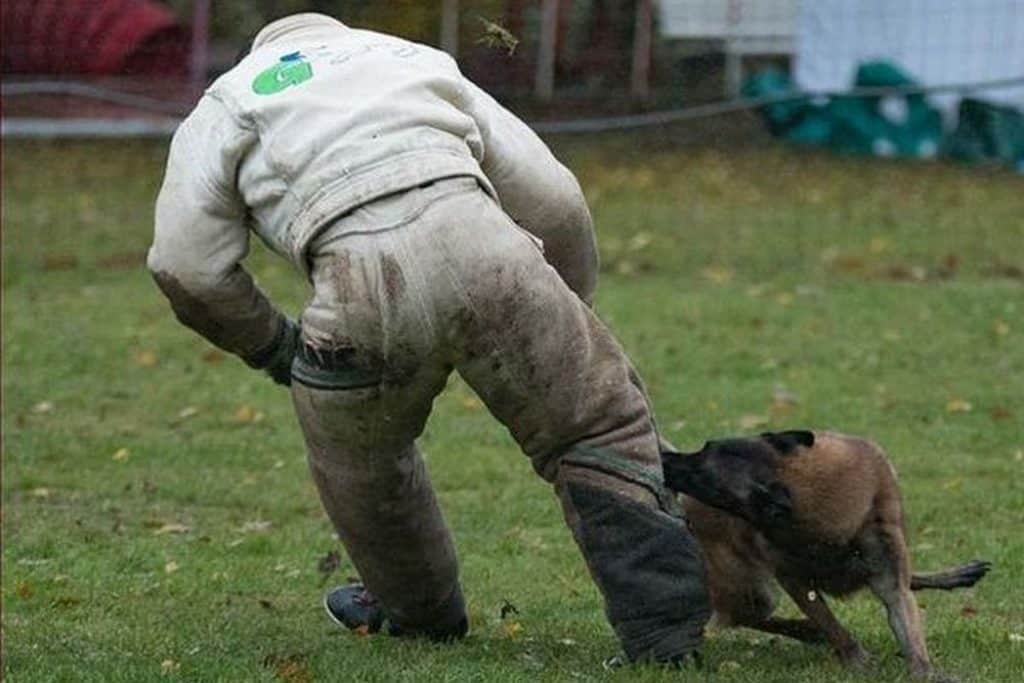
Among all other dogs, why do Belgian Malinois bite so much?
Belgian Malinois are a breed that often have biting problems. This could be due to several factors.
Here are some reasons why your Belgian Malinois could be biting so much:
1. Territorial Instincts
The Belgian Malinois is a very territorial breed of dog.
This means that he likes to protect and guard the property where he lives and the yard or garden.
He will mark this territory to let other dogs know that this is his territory. However, some territorial dogs could develop problems such as aggressiveness.
Aggressive dogs may display behavioral traits such as barking, growling, fighting, snapping, and biting.
These actions will most likely be displayed toward other dogs, especially of the same sex. Belgian Malinois is considered to be naturally a very territorial breed.
In some individuals of this breed, their territorial instincts will make them prone to biting other dogs.
Belgian Malinois males tend to be more territorial than females.
As well as that, males often possess more strength and they could be more aggressive and willing to bite.
A Belgian Malinois biting or fighting a smaller dog could result in serious harm or injury for the latter.
2. Belgian Malinois Has Not Been Taught Not To Bite
Puppies will bite, whether it is a Belgian Malinois or any other breed.
Puppies like to mouth and chew on things, especially due to the fact that their little teeth are coming in.
They do this to relieve the pain and itch.
Puppies also like to bite because it is a force of habit, or because they are playing.
In a litter, puppies will play fight and wrestle among themselves, biting each other playfully.
Play biting is not an intentionally bad behavior. But it can quickly get out of hand, and potentially hurt someone.
This is why puppies should be taught early on that biting is not an acceptable behavior. This is critical for them, otherwise this conduct will carry on into adulthood.
Adult Belgian Malinois have very sharp teeth and strong jaws, so biting, although playfully, could lead to a lot of damage.
For some, it may seem like there is nothing wrong with this playful behavior. Belgian Malinois like rough play, and biting will simply be a part of it.
But for a Belgian Malinois living in a family with kids, or when other children come over, this could be an issue.
The Belgian Malinois could be playing happily, but unbeknownst to him, his playful biting could harm or injure the child.
Not only do Belgian Malinois puppies need proper training to learn to stop biting, but they also need proper socialization in their earliest months.
A young puppy must be introduced to different people and children, and other dogs and animals.
They need to allowed to socialize and interact with them.
This will teach the little Belgian Malinois about the world and how to treat both humans, dogs, and other creatures.
A lack of understanding and no knowledge or interaction with strangers might lead to hostility as adult dogs.
This, in turn, could lead to aggression, and with this will come growling, snapping, or even biting.
4. Inherited Genetics
Some Belgian Malinois may inherit aggressiveness from their parents, and this gene may cause them to display viciousness.
One form of an aggressive, vicious behavior could be biting.
Belgian Malinois individuals with inherited aggressiveness can be prone to biting other dogs, animals, and even strangers.
Even though the genetic make up of the dog cannot be altered, training can be put into place to tame aggressive behavior.
It can also help the dog become calmer and practice self-control.
5. Not Enough Physical Activity Or Boredom
Why do Belgian Malinois bite so much due to not enough physical activity?
If a Belgian Malinois has excess pent up energy, they will be more prone to showing destructive behaviors to release it.
They could also be less able to self-regulate their actions. Among these destructive behaviors is biting and chewing.
A Belgian Malinois that is bored is also more likely to bite.
Ensure your Belgian Malinois is exercised regularly, at least 3 to 4 times a day for 20 minutes at a time.
There should be running or active games included in this exercise regimen.
If your Belgian Malinois does not have excess energy or boredom, they will not be prone to biting or chewing as much.
6. High Prey Drive
The Belgian Malinois dog breed has what is called a high prey drive.
This is a natural instinct they have which will cause them to want to chase animals.
They will especially want to run after small dogs, cats, rabbits, or even children.
However, Belgian Malinois could also possibly chase adults, pedestrians, bikers, joggers, the postman, or vehicles.
When a Belgian Malinois is chasing down an animal, he may snap at them or bite them, viewing it as its victim or quarry.
7. Herding Instincts
Belgian Malinois were originally bred as herding dogs, to both herd and guard sheep.
When doing their work, these dogs would nip and bite the back legs of the sheep to hurry them along.
These herding instincts still naturally remain with the Belgian Malinois up until today. As a result, they may be inclined to chase after other dogs, cats, or children.
As they are doing this, they may nip or bite their legs.
This is an instinctive behavior that they demonstrate, passed down onto each generation of this breed.
8. Separation Anxiety
Separation anxiety could become a problem in a Belgian Malinois if this dog is left alone on its own for too long often.
It could also result if the dog does not receive enough socialization on a daily basis.
Separation anxiety in this dog leads to a range of different problematic and destructive behaviors.
These include barking, howling, growling, withdrawal, chewing, digging, trembling, snapping, or biting.
9. Previous Treatment
If you are adopting a rescue Belgian Malinois, it could be expected that the dog may have some behavioral issues.
Even though this is not always the case, it is likely that your dog could have had owners that did not care for him properly.
The dog could have been neglected, underfed, or beaten.
The dog could have learnt and used biting as a self-defense method. Now any time the dog feels fearful, it could bite to protect itself.
Even though you mean no harm to your rescued Belgian Malinois, the dog will not understand this.
It will take time before your dog learns to trust you and realize that you mean no harm, and he does not need to bite.
How To Stop Belgian Malinois From Biting?
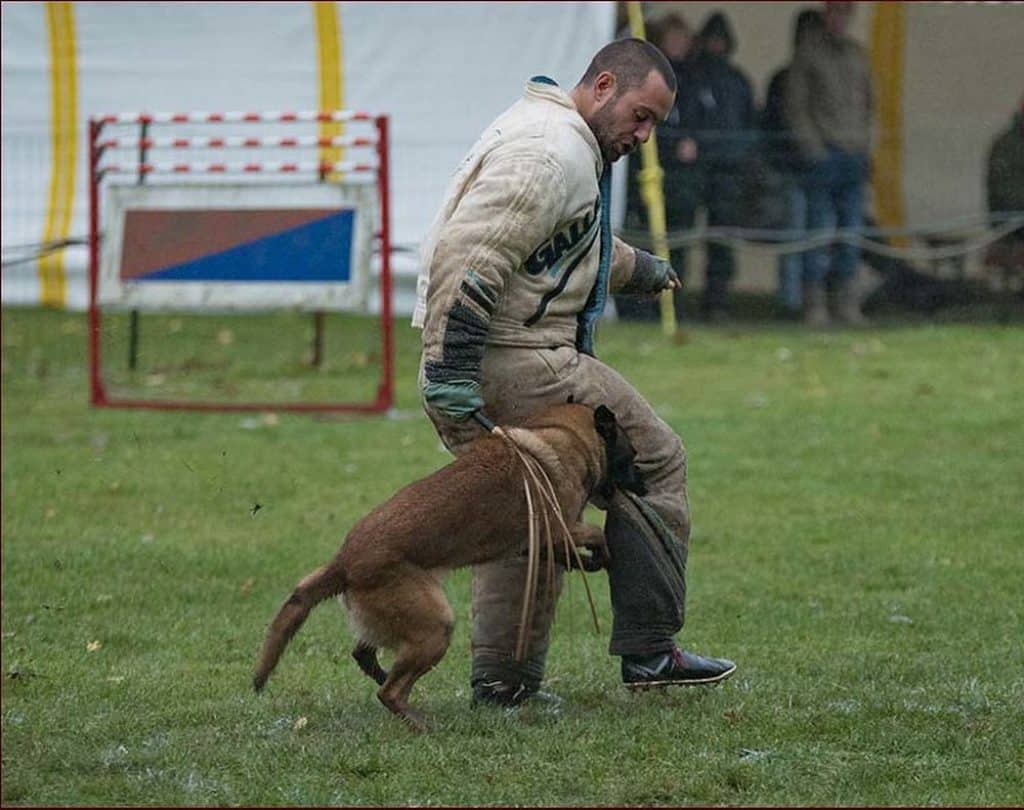
To stop a Belgian Malinois from biting, whether a puppy or an adult, first of all make sure your dog has enough exercise.
Your dog also needs to have something else to chew on, like a rawhide bone. This will prevent him from drawing greater attention onto biting you or your clothes.
However, some Belgian Malinois are provided with both exercise and things to chew on, and they could still tend to bite.
In this case, you will need to teach your dog step by step that biting is not acceptable.
So then, how can I teach my Belgian Malinois to stop biting?
- When your Belgian Malinois is biting you, pull away, stamp hard on the floor with your shoe and say ‘No Biting’.
- When he stops, immediately praise him and reward him
- If he begins to bite again, repeat the same actions
- Ensure to reward your dog with a treat each time he stops the act of biting, to show him what you approve of.
The loud, forceful stamp on the ground will signify your disapproval. Your dog will see that you are unhappy, and the loud stamp will startle him and alert him.
As soon as he calms down and stops the action, he will receive praise and a treat.
[amazon box=”B07BVL8TQF”]
Additionally, the command ‘No Biting’ will stick in his head and he will associate it with your disapproval of his biting actions.
Your Belgian Malinois will realize that biting is an unacceptable conduct – but whenever he calms down and stops it will reward him.
This will make him want to stop biting and instead continue the good behavior as it brings him praise and rewards.
Belgian Malinois Temperament
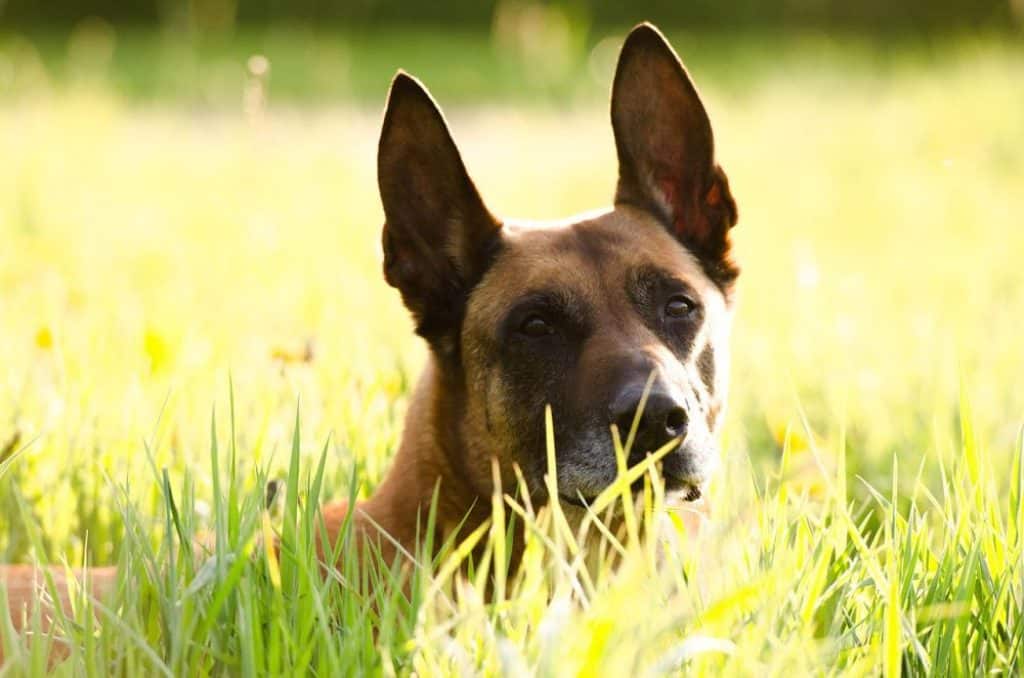
Belgian Malinois are not your typical lap dogs. These dogs have boundless energy – they are athletic, agile, and hard working.
Their tireless energy and high work drive can keep them going for hours on end without becoming exhausted or fatigued.
They can jump, climb, and chase swiftly.
Belgian Malinois are intelligent and fast-learning. They have great trainability and can learn a wide range of different commands and actions.
These dogs are one of the best naturally protective dogs in the world. They are protective over their family and will guard their property.
They are watchful, alert, and wary. They look up to their leader and are always eager and zealous to please, follow commands, and fulfill their work or tasks.
Belgian Malinois form an exceptionally strong bond and attachment with their owners.
Thus, they will only reserve that loyalty and affection for their human partner and family members.
They love to have social interaction with their owner every day, or else they could become unhappy.
Toward strangers these dogs will show nothing more than aloofness.
They will be cautious around those they do not know, and watch out for their family near any visiting strangers.
They are also territorial dogs, so they will guard and mark their property against other members of their kind.
Are Belgian Malinois Naturally Aggressive?
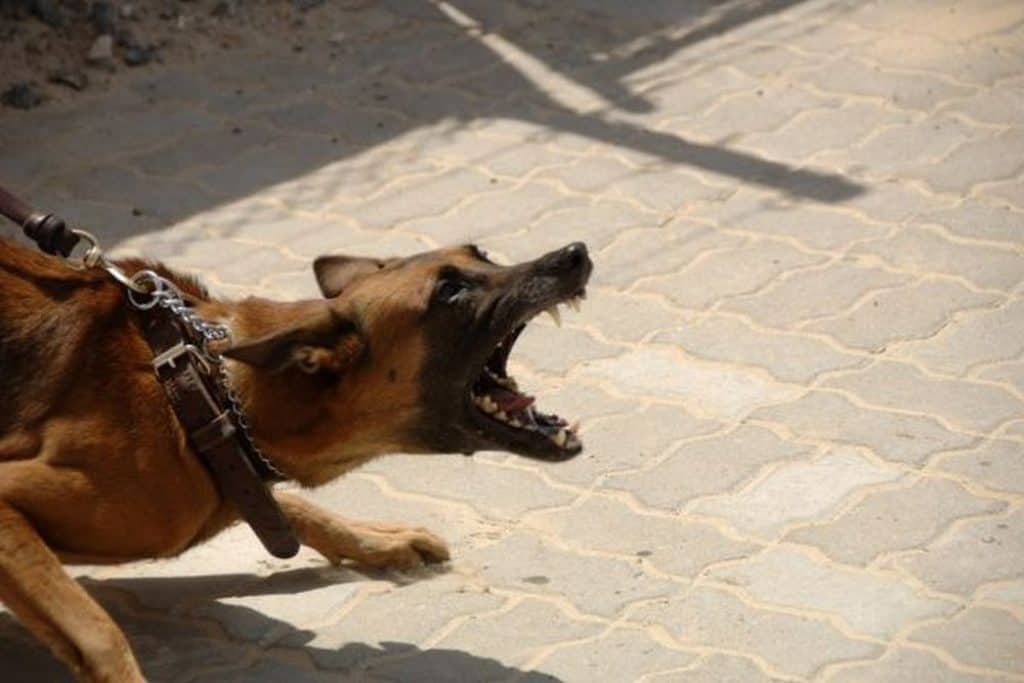
Some Belgian Malinois individuals can be prone to natural and instinctive aggressiveness.
This may not be due to any particular factors or reasons, but simply because of the dog’s genetic makeup.
Belgian Malinois are a protective, guarding, and territorial breed. Therefore it is natural for some of these dogs to show aggression.
Belgian Malinois will most likely show aggression to other dogs, especially of the same sex, rather than humans.
They could also show aggression to cats or other animals. They might show aggression to strangers as well, but this is not as common.
This is because of the fact that they want to obey and please their owner, so they would not demonstrate an unacceptable behavior.
A well trained Belgian Malinois will know that even if they wanted to show aggression, it would displease their owner.
If, however, the Belgian Malinois feels threatened, or their family is in danger, this dog will not hesitate to show aggression or attack.
Are Belgian Malinois Good With Kids?
Belgian Malinois can be very good with kids, but these dogs need to receive proper socialization with them upon first meeting.
A puppy Belgian Malinois must be introduced to kids early on in their life to be able to get familiar with them.
A well socialized Belgian Malinois will be an outstanding guard and protector for children, so that no harm comes their way.
They can also be great companions and wonderful, energetic play mates.
At the same time, Belgian Malinois do have a high prey drive, so it could be possible for some dogs to chase and even nip kids.
As their leader, you will need to train and teach your dog that this behavior is absolutely not permitted.
If you are still worried, be sure to supervise your kids, especially small ones, when they are playing with your Belgian Malinois.
Conclusion
In conclusion, why do Belgian Malinois bite so much?
This can be due to several factors. Namely, high prey drive, herding or territorial instincts, genetics, improper training or socialization, boredom, and excess energy.
A rescued Belgian Malinois might bite due to previous ill treatment.
Belgian Malinois can also be naturally aggressive. Aggression often leads to biting.
However, a good training regimen will help your Belgian Malinois learn that aggression toward others and biting is an unacceptable thing.
With proper training and socialization, the Belgian Malinois can be an excellent family pet.
They will not only be loyal to you, but they will be affectionate guardians to your children as well.


